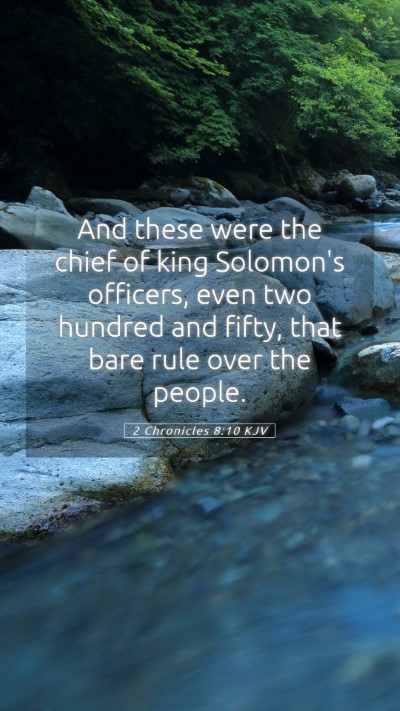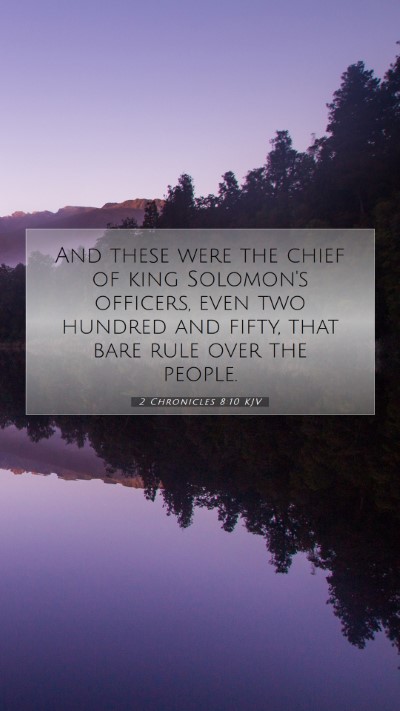Understanding 2 Chronicles 8:10: A Comprehensive Bible Verse Commentary
Bible Verse: 2 Chronicles 8:10 - "And these were the chief of king Solomon's officers, even two hundred and fifty, that bare rule over the people."
This verse provides insight into the administrative structure established by King Solomon. To fully grasp its meaning, several public domain commentaries contribute valuable exegesis and contextual analysis.
Verse Context and Background
The historical context of 2 Chronicles 8:10 is set during the reign of Solomon, who is renowned for his wisdom and monumental building projects, including the Temple in Jerusalem. The verse highlights the organization of his government, indicating a well-structured leadership.
Key Insights from Commentaries
Matthew Henry's Commentary
Matthew Henry emphasizes Solomon’s capacity for leadership and governance. He points out that the two hundred and fifty officers signal Solomon's dedication to maintaining order and efficiency within a rapidly growing population. Henry mentions that such organization was vital for the administration of justice and for managing the numerous tasks associated with the temple projects. He reflects on the idea that good leadership involves delegating authority, ensuring that the king had capable individuals to oversee various responsibilities.
Albert Barnes' Notes on the Bible
Albert Barnes highlights the administrative aspects mentioned in the verse. He explains that the “chief of king Solomon’s officers” were not merely figureheads but pivotal in the successful implementation of royal edicts. His commentary suggests that this structure allowed Solomon to focus on broader governance issues while ensuring that daily affairs were attended to by appointed officials. Barnes points out that governance requires not only a wise ruler but also a competent administrative body to carry out the king’s vision.
Adam Clarke's Commentary
Adam Clarke offers insights into the implications of having a large number of officers. He notes that this setup illustrates the increasing complexity of governance during Solomon's reign. Clarke also emphasizes the importance of having an effective administration, which could manage resources, enforce laws, and foster a stable environment for the people. He connects this administrative structure back to divine favor, suggesting that a well-ordered state reflects God’s blessing on Solomon’s kingship.
Major Themes and Applications
- Leadership and Delegation: The verse teaches about the importance of delegation in leadership. Effective leaders, like Solomon, recognize the necessity of entrusting responsibilities to others to ensure smooth governance.
- Organization and Structure: Solomon's structured administration serves as a model for effective community leadership. This is relevant to modern-day organizations, where clear hierarchical structures can enhance productivity and accountability.
- The Role of Authority: Authority figures are vital for guiding people and ensuring order. This verse can lead to discussions in Bible study groups about the nature of authority in both sacred and secular contexts.
Broader Biblical Implications
2 Chronicles 8:10 also speaks to broader biblical themes of divine order and governance. A well-run administration is not only practical but also reflects God’s character of order and intentionality.
Taking it Forward: Application in Daily Life
Understanding this verse encourages individuals to reflect on their roles within their communities or workplaces. Whether leading a small group, a family, or a larger organization, wise delegation and structured leadership can enhance collective goals.
Cross References
- 1 Kings 9:23 - Discuss the officers serving Solomon.
- 2 Chronicles 4:2 - Address the organization of resources.
- 1 Chronicles 28:21 - Reiterate the importance of organized leadership.


